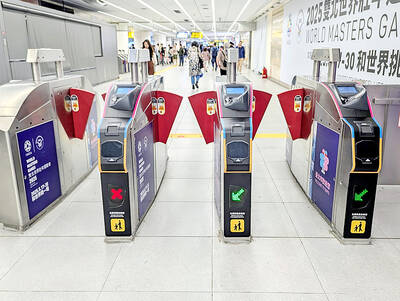A Japanese court has ordered public broadcaster NHK to pay almost US$10,000 in damages to a female Taiwanese Aborigine for defaming her by using the term “human zoo” in a program, officials said yesterday.
Overturning a lower court ruling, the Tokyo High Court on Thursday ordered NHK to pay ¥1 million (US$9,774) to the woman, with Presiding Judge Noriaki Sudo reportedly saying the broadcaster used a term that had a “serious discriminatory meaning.”
The program looked at the “Japan-Britain Exhibition” held in London in 1910, to which Japan took several members of Taiwan’s Aboriginal population, including the father of the woman, as exotic exhibits, Jiji Press and Kyodo News reported.
Taiwan was a Japanese colony at the time and the practice of exhibiting the little-known peoples of far-flung territories was a common one among imperial powers.
Historians say Japan, which had emerged from self-imposed isolation just half a century earlier, joined in partly as an attempt to establish itself as an imperial power and mitigate the perceived risk of it being colonized itself.
In the ruling, Sudo said NHK “repeatedly used the term without giving consideration to its discriminatory meaning,” which implied the Paiwan Aborigines were uncivilized, the Tokyo Shimbun reported.
Some of those who took part did so earnestly and not as mere curiosities, the judge said, according to the paper.
In a statement yesterday, NHK said: “We are sorry that our argument was not taken up. We will decide how to deal with the issue after studying closely the court’s verdict.”

A magnitude 6.4 earthquake struck off the coast of Hualien County in eastern Taiwan at 7pm yesterday, the Central Weather Administration (CWA) said. The epicenter of the temblor was at sea, about 69.9km south of Hualien County Hall, at a depth of 30.9km, it said. There were no immediate reports of damage resulting from the quake. The earthquake’s intensity, which gauges the actual effect of a temblor, was highest in Taitung County’s Changbin Township (長濱), where it measured 5 on Taiwan’s seven-tier intensity scale. The quake also measured an intensity of 4 in Hualien, Nantou, Chiayi, Yunlin, Changhua and Miaoli counties, as well as

Credit departments of farmers’ and fishers’ associations blocked a total of more than NT$180 million (US$6.01 million) from being lost to scams last year, National Police Agency (NPA) data showed. The Agricultural Finance Agency (AFA) said last week that staff of farmers’ and fishers’ associations’ credit departments are required to implement fraud prevention measures when they serve clients at the counter. They would ask clients about personal financial management activities whenever they suspect there might be a fraud situation, and would immediately report the incident to local authorities, which would send police officers to the site to help, it said. NPA data showed

ENERGY RESILIENCE: Although Alaska is open for investments, Taiwan is sourcing its gas from the Middle East, and the sea routes carry risks, Ho Cheng-hui said US government officials’ high-profile reception of a Taiwanese representative at the Alaska Sustainable Energy Conference indicated the emergence of an Indo-Pacific energy resilience alliance, an academic said. Presidential Office Secretary-General Pan Men-an (潘孟安) attended the conference in Alaska on Thursday last week at the invitation of the US government. Pan visited oil and gas facilities with senior US officials, including US Secretary of the Interior Doug Burgum, US Secretary of Energy Chris Wright, Alaska Governor Mike Dunleavy and US Senator Daniel Sullivan. Pan attending the conference on behalf of President William Lai (賴清德) shows a significant elevation in diplomatic representation,

The Taipei MRT is to begin accepting mobile payment services in the fall, Taipei Rapid Transit Corp said on Saturday. When the company finishes the installation of new payment units at ticketing gates in October, MRT passengers can use credit cards, Apple Pay, Google Pay and Samsung Pay, the operator said. In addition, the MRT would also provide QR payment codes — which would be compatible with Line Pay, Jkopay, iPass Money, PXPay Plus, EasyWallet, iCash Pay, Taiwan Pay and Taishin Pay — to access the railway system. Currently, passengers can access the Taipei MRT by buying a single-journey token or using EasyCard,